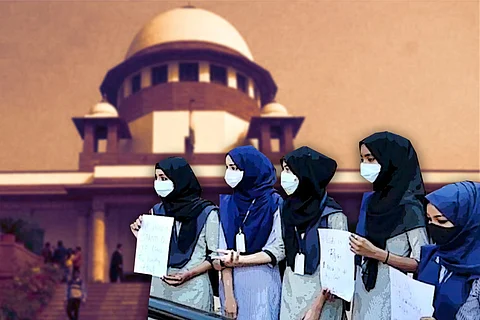

The two judge bench of the Supreme Court gave a split verdict in the Karnataka hijab case, with Justices Hemant Gupta and Sudhanshu Dhulia disagreeing on whether the hijab should be banned in classrooms in the state. While Justice Hemant Gupta upheld the Karnataka High Court order supporting the Karnataka government's decision to bar Muslim students from wearing the hijab in classrooms in the state, Justice Sudhanshu Dhulia disagreed on the ban. The case will now go to a larger bench of the Supreme Court.
The Supreme Court judgment comes following a marathon hearing spread over 10 days by a bench headed by Justice Hemant Gupta and Justice Sudhanshu Dhulia who heard arguments from the petitioners representing students and the counsels representing the Karnataka government, and a collective of college teachers.
The Supreme Court was hearing a batch of petitions which challenged an order passed by the Karnataka High Court in March 2022 which effectively upheld the state government’s order barring the wearing of hijab or headscarves in classrooms of educational institutions in the state.
The issue reached the High Court after a petition was filed by students of a government pre-university college in Udupi district of Karnataka which disallowed Muslim girl students from entering their college classroom because they were wearing the hijab.
The dispute in the college began in December 2021 and made international headlines when a group of Muslim students were photographed studying on the stairs outside their classrooms in January 2022 drawing reporters from international and national publications to Udupi district. The Muslim students were backed by the Campus Front of India, the student wing of the Muslim organisation Popular Front of India (PFI) which was banned in September 2022.
The dispute later sparked violent protests in several districts in the state in the first week of February 2022 when Hindu students wearing saffron shawls stood opposed to their classmates wearing the hijab. TNM had earlier reported that Hindu students who wore the saffron shawls to college were backed by the Hindutva group Hindu Jagarana Vedike in Udupi.
On February 5 2022, the Karnataka government mandated a dress code, banning the wearing of clothes which 'disturb equality, integrity and public order' in schools and colleges.
The government order was challenged in court by petitioning Muslim students arguing that wearing the hijab is a part of their faith and it is their fundamental right to do so. But the Karnataka High Court upheld the state government’s order enforcing a uniform dress code and held that wearing of hijab by Muslims was not an essential religious practice of Islam. Currently in Karnataka, only a few private institutions which are Muslim-run are allowing the wearing of hijab on-campus.
Following the verdict, a number of Muslim girls studying in colleges in Udupi and Dakshina Kannada transferred out to colleges where the hijab is still allowed, mostly in Muslim-run institutions. Responses to RTIs filed by Harsha, a journalist with the Deccan Herald based in Mangaluru, showed that 145 out of 900 Muslim girls studying in colleges affiliated to Mangaluru University had collected their transfer certificates following the hijab controversy in Karnataka this year. The university has six constituent colleges and 206 affiliate colleges in Udupi, Dakshina Kannada and Kodagu districts.